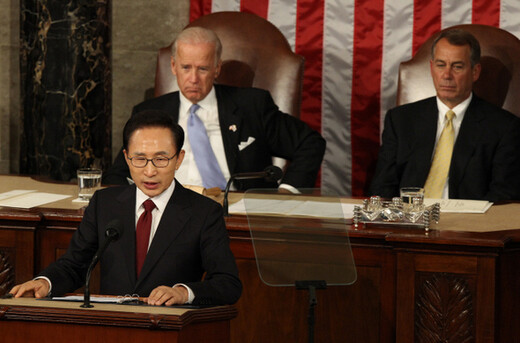hankyoreh
Links to other country sites 다른 나라 사이트 링크
[Editorial] Lee’s outsourced diplomacy

It has come to light that President Lee relied heavily on a U.S. speechwriting firm for the text of his major speeches and statements when he was visiting the United States last month. The Korean Embassy in the United States reportedly paid $46,500 (around 51 million won) to the Washington-based company West Wing Writers, primarily for draft writing and revisions on three texts: speeches to the U.S. Chamber of Commerce, a joint speech to Congress, and a statement at the White House.
When a president is giving a speech on a visit overseas, it is of paramount importance that it include his or her own diplomatic philosophy and values. It also goes without saying that the president should represent the country’s interests on major issues in bilateral relations with the country in question. On this basis, he or she should present methods for effective cooperation, with South Korea serving as a good friend to whoever the other party happens to be. The speech needs to carry a condensed expression of the country’s interests at that point and time.
West Wing Writers has been described as a business that drafts speeches for U.S. politicians and companies. Being a U.S. company, it likely possesses a stronger understanding of U.S. political culture. It may, for example, be amply suited to advising a foreign leader as to what ideas and expressions should be used in the speech if he or she wishes to be welcomed by the country. But it is very questionable indeed how clearly that business will understand the philosophy or values that the South Korean president needs to uphold or the country’s interests at this juncture. So while the embassy may accept some partial assistance from a local business, it is inappropriate to entrust it with virtually the entire process, from drafting to strategic suggestions and modifications.
The Cheong Wa Dae (the presidential office in South Korea or Blue House) has said that the text was merely one of many drafts solicited by the embassy from various organizations to draft the president’s speech. But the Ministry of Foreign Affairs and Trade (MOFAT) and the Korean Embassy in the United States are the principal institutions bearing responsibility for the president’s U.S. visits. It stands to reason that the draft sent by the embassy through the foreign ministry will very likely be reflected in the final text of the speech. To see such an important duty handed off to a foreign company, one has to ask just what exactly our diplomats are doing. It is disappointing for South Koreans, who believed these officials would struggle and fight to go that extra mile in representing the country’s interests.
The U.S. focus of the Lee Myung-bak administration’s diplomatic efforts is generating concerns about potential damages. Recently, the Korean Embassy in the United States paid a U.S. company to lobby for a quick passage of the South Korea-U.S. Free Trade Agreement (KORUS FTA) in Congress. There seems to be no end to the soulless actions of diplomats.
Please direct questions or comments to [englishhani@hani.co.kr]
Editorial・opinion
![[Guest essay] Amending the Constitution is Yoon’s key to leaving office in public’s good graces [Guest essay] Amending the Constitution is Yoon’s key to leaving office in public’s good graces](https://flexible.img.hani.co.kr/flexible/normal/500/300/imgdb/original/2024/0416/8917132552387962.jpg) [Guest essay] Amending the Constitution is Yoon’s key to leaving office in public’s good graces
[Guest essay] Amending the Constitution is Yoon’s key to leaving office in public’s good graces![[Editorial] 10 years on, lessons of Sewol tragedy must never be forgotten [Editorial] 10 years on, lessons of Sewol tragedy must never be forgotten](https://flexible.img.hani.co.kr/flexible/normal/500/300/imgdb/original/2024/0416/8317132536568958.jpg) [Editorial] 10 years on, lessons of Sewol tragedy must never be forgotten
[Editorial] 10 years on, lessons of Sewol tragedy must never be forgotten- [Column] A death blow to Korea’s prosecutor politics
- [Correspondent’s column] The US and the end of Japanese pacifism
- [Guest essay] How Korea turned its trainee doctors into monsters
- [Guest essay] As someone who helped forge Seoul-Moscow ties, their status today troubles me
- [Editorial] Koreans sent a loud and clear message to Yoon
- [Column] In Korea’s midterm elections, it’s time for accountability
- [Guest essay] At only 26, I’ve seen 4 wars in my home of Gaza
- [Column] Syngman Rhee’s bloody legacy in Jeju
Most viewed articles
- 1[Guest essay] Amending the Constitution is Yoon’s key to leaving office in public’s good graces
- 2[Editorial] 10 years on, lessons of Sewol tragedy must never be forgotten
- 3Faith in the power of memory: Why these teens carry yellow ribbons for Sewol
- 4Final search of Sewol hull complete, with 5 victims still missing
- 5[Guest essay] How Korea turned its trainee doctors into monsters
- 6How Samsung’s promises of cutting-edge tech won US semiconductor grants on par with TSMC
- 7Korea ranks among 10 countries going backward on coal power, report shows
- 8Pres. Park an accomplice in ordering resignation of CJ Group vice chairman
- 9[News analysis] Watershed augmentation of US-Japan alliance to put Korea’s diplomacy to the test
- 10K-pop a major contributor to boom in physical album sales worldwide, says IFPI analyst